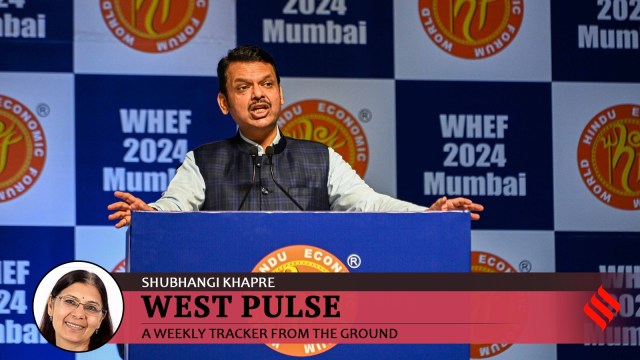Why BJP push for ‘love jihad’ law in Maharashtra may hit turbulence
Ajit Pawar NCP remains non-committal over proposed law, RPI(A) chief Athawale voices dissent, while Opposition MVA attacks it for “targeting” Muslims.
 Chief Minister Devendra Fadnavis has repeatedly expressed its government’s commitment to enact a law against “love jihad”. (Express Archives: Sankhadeep Banerjee)
Chief Minister Devendra Fadnavis has repeatedly expressed its government’s commitment to enact a law against “love jihad”. (Express Archives: Sankhadeep Banerjee)Buoyed by its massive win in the Maharashtra Assembly polls, the BJP-led Mahayuti led by Chief Minister Devendra Fadnavis has repeatedly expressed its government’s commitment to enact a law against “love jihad” or “forced religious conversion”. However, the road ahead seems to be marked with various hurdles as some Mahayuti allies as well as the Opposition have expressed concerns over the proposed law.
Fadnavis said his government is not against interfaith marriages, but claimed that the instances of atrocities and fraud were on the rise. “However, where marriages happen through coercion, using false identities and with an objective of religious conversions and harassment, they need to be firmly tackled through an Act,” the CM said in Nagpur Sunday.
Undeterred by the opposition to the proposed law, the Mahayuti government – comprising the BJP, the Shiv Sena led by Deputy CM Eknath Shinde and the Nationalist Congress Party (NCP) led by Deputy CM Ajit Pawar – has taken its first step against “love jihad”, a phrase used by the right wing to allege a conspiracy by Muslim men to convert Hindu women to Islam through marriage.
In line with its pre-poll promise, the Fadnavis dispensation issued a government resolution (GR) last week stating its intent to enact the law to curb the “love jihad” cases. The state government constituted a seven-member committee, headed by the director general of police (DGP), in this regard, which will look into the legal provisions, develop a legal framework and study similar laws in other states like BJP-ruled Rajasthan, which tabled an anti-conversion law in its Assembly earlier this month.
Despite having the numbers to pass the “anti-love jihad” law in the Assembly and move towards implementing it, the Mahayuti government is likely to tread cautiously before tabling the Bill in the House.
While Fadnavis claims it is a social issue, increased pressure from various right wing outfits is seen to be a key reason for the government’s proposal to bring in an “anti-love jihad” law. During 2022-2024, over 50 such outfits, including the BJP, undertook a campaign across the state in favour of the law under the aegis of the Sakal Hindu Samaj. Their rallies drew massive crowds, leading to intense communal polarisation ahead of the last year’s Lok Sabha and Assembly polls.
A strong advocate of this law, Mangal Prabhat Lodha, BJP leader and state Cabinet minister, said it was necessary to check instances of “love jihad”. “Such incidents are on the rise, especially in Mumbai. There are a large number of cases where Hindu girls have become victims,” he claimed.
However, some of the BJP’s allies do not seem to be on the same page. While the NCP, which enjoys significant support among Muslims, has been non-committal on the issue, the RPI(A) led by Union minister Ramdas Athawale has openly expressed its displeasure over the proposed law.
“We will not make any hasty commitment on such a sensitive subject. Nobody is against interfaith marriages and that is our stand as well. If crimes against women involved in interfaith marriages are on the rise, they need to be ascertained and tackled but we do not support singling out a community,” an NCP minister said on condition of anonymity.
Sources said the BJP has reassured its ally that the proposed law will not be tabled in the upcoming Budget session of the Assembly as the party is aware that introducing it will give the Opposition a chance to highlight the fissures within the ruling coalition. “The government panel will also require sufficient time to study similar laws in other states,” sources said.
Athawale, on the other hand, was more explicit with his dissent. “Terming interfaith marriages as ‘love jihad’ is wrong and unacceptable to us. The Constitution does not discriminate based on caste, community and religion. Prime Minister Narendra Modi has initiated several welfare schemes which are equally beneficial to all. Then, why discriminate with interfaith marriages? If there are instances of crimes in such marriages, strong laws should deal with them,” he said.
An official in the legal department said that the proposed law would “smoothly pass the legislative test”. “However, it will get entangled in a legal battle if anyone approaches the courts against it. The government probably wants to avoid this,” the official said.
The proposed law may also have a bearing on the civic polls, scheduled for later this year where all six major parties – the three Mahayuti partners as well as the Congress, Shiv Sena (UBT) and NCP(SP) of the Opposition Maha Vikas Aghadi (MVA) – are likely to go solo.
In such a scenario, the BJP would look to aggressively push its Hindutva agenda through the proposed law, especially in Mumbai – which has sizeable Muslim pockets – to counter the Uddhav Thackeray-led Sena (UBT), which has held the Brihanmumbai Municipal Corporation (BMC) for over three decades. Along with the “love jihad” plank, the BJP is also likely to use its other issues like “land jihad” and “vote jihad” during its campaign for the civic polls.
“We are not going to compromise on our stand on Hindutva. Bringing in a ‘love jihad’ law which does not have legal and constitutional validity would defeat our stated objective. We need to ensure adequate safeguards (in the Bill before tabling it),” a BJP leader said.
The MVA has claimed that the proposed law is “just a pretext adopted by the right wing to push its anti-Muslim agenda”. “Instead of worrying about marriage, which is a personal choice, the government should focus on the economy,” NCP(SP) MP from Baramati, Supriya Sule, said.
Dismissing the move as the BJP’s “right wing rhetoric”, Sena (UBT) Rajya Sabha MP Sanjay Raut last week accused the former of indulging in “divisive politics”.
Congress leader Vijay Waddetiwar alleged that the BJP was using “its politics of hatred to aggressively target a community”.
Maulana Azad Manch chief Hussain Dalwai questioned the need for such a law. “When we already have laws in place to deal with such issues, what is the need for a new legislation? All these terms like ‘love jihad’ and ‘land jihad’ are made up by the BJP to communally divide society and reap electoral benefits. It is detrimental to a progressive state like Maharashtra,” he said.
- 01
- 02
- 03
- 04
- 05






























